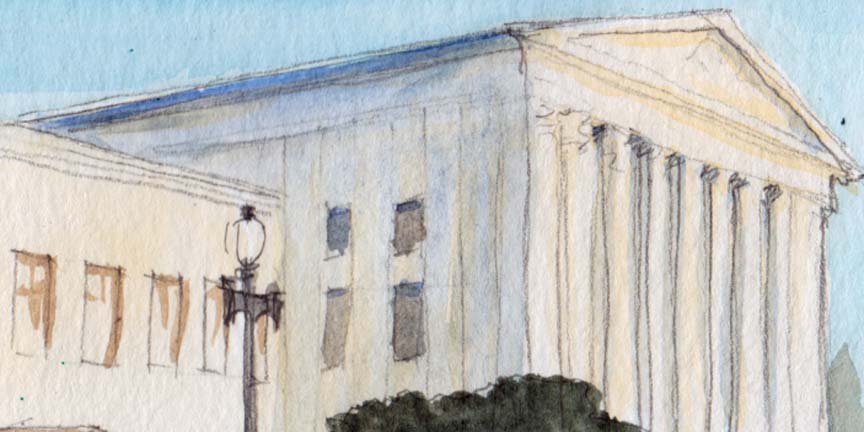Government seeks emergency relief on asylum rule (UPDATED)

on Aug 26, 2019 at 7:17 pm

The battle over immigration through the southern border of the United States came to the Supreme Court today. The federal government asked the justices for permission to enforce a new rule that would bar most migrants from seeking asylum in this country if they pass through another country before arriving in the United States.
The case, Barr v. East Bay Sanctuary Covenant, began last month after the government enacted an interim rule that, Attorney General William Barr explained, was intended to reduce the “burdens associated with apprehending and processing hundreds of thousands of” immigrants along the U.S.-Mexico border. At the same time, Barr stressed, the interim rule carves out a variety of exceptions – for example, for victims of human trafficking and for refugees who traveled through countries where protection was not available – to ensure that immigrants who legitimately fear torture or persecution at home will not be sent back.
Four groups that provide services to immigrants and refugees went to court in California to challenge the rule. U.S. District Judge Jon Tigar blocked the government from enforcing the interim rule anywhere in the United States, reasoning that the rule “is likely invalid because it is inconsistent with the existing asylum laws.” For example, Tigar noted, Congress has already “created a bar to asylum for an applicant who may be removed to a ‘safe third country.’”
The government then went to the U.S. Court of Appeals for the 9th Circuit, asking the court of appeals to allow it to enforce the interim rule while it appeals. The government fared slightly better in the 9th Circuit, which continued to bar the government from enforcing the interim rule in the geographic area covered by the 9th Circuit – which includes California and Arizona – but allowed the government to implement the rule in the rest of the country. The court of appeals also left open the possibility, however, that the district court could consider more evidence to support a nationwide ban on enforcing the rule.
In a filing this afternoon by U.S. Solicitor General Noel Francisco, the government urged the justices to allow it to enforce the new interim rule nationwide while it appeals to the 9th Circuit and, if necessary, the Supreme Court. If the court of appeals upholds Tigar’s ruling, the government contended, it is likely that the Supreme Court will grant review: The interim rule “serves important national purposes,” such as protecting “the integrity of our borders,” the government emphasized, and “is part of a coordinated and ongoing diplomatic effort regarding the recent surge in migration.”
Moreover, the government continued, if the court grants review, there is at least a “fair prospect” (another requirement for relief) that the justices will reverse the 9th Circuit’s ruling. Not only do the groups lack a legal right to challenge the interim rule, the government suggested, but – contrary to the 9th Circuit’s reasoning – the government is not required to provide notice of the proposed rule and an opportunity for public comments, because doing so would disrupt negotiations with neighboring countries about migration.
Finally, putting everything else aside, the government concluded, the four groups challenging the rule are, at most, entitled to have the government prohibited from enforcing the rule as to their own clients rather than to a broader nationwide or even circuitwide ban.
The government’s request went to Justice Elena Kagan, who handles emergency requests from the 9th Circuit. Although Kagan could rule on the request herself, she is more likely to refer it to the full court. UPDATE: Kagan has called for the groups to submit a response to the government’s filing, due September 4 at 3:00 p.m. ET.


